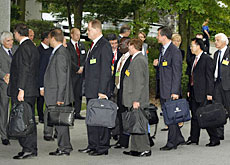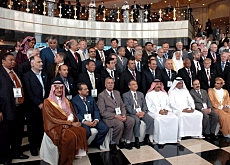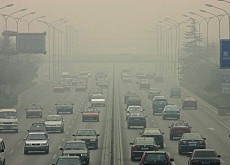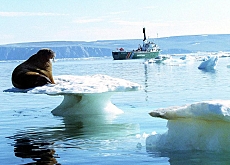Ministers clear air ahead of climate meeting

Environment ministers have held informal talks in Zurich ahead of the international climate change conference in Nairobi in November.
Swiss Energy Minister Moritz Leuenberger and Kenyan Environment Minister Kivutha Kibwana, who jointly chaired the talks, said on Friday that the “frank” and “concrete” discussions should ensure progress is made in the Kenyan capital.
Developed countries promised at the two-day meeting to do more for poorer nations, especially in Africa, to help them cope with the impact of climate change.
More than 25 environment ministers and other delegates from some 40 countries met in Rüschlikon near Zurich on Thursday and Friday to prepare the ground for the Nairobi conference.
That meeting will focus on the second phase of the Kyoto Protocol, looking at the objectives for reducing greenhouse gases beyond 2012 and how to involve countries that have not signed up.
“The sense I got was that people want practical progress,” said Kibwana, who will chair the November conference. “They want Nairobi to be fruitful and not just a talking-shop.”
According to the Federal Environment Office, the delegations have managed to fine-tune the Nairobi agenda down to three priority areas: the future of international climate policy, measures to help countries adapt to climate change, and priorities for Africa and other developing countries.
Support
Under the 1994 United Nations Framework Convention on Climate Change, poor countries should receive financial or technical support from richer nations to help reduce greenhouse-gas emissions and adapt to the consequences.
In practice, many poor countries have received next to nothing, admitted the two ministers.
“Very important progress can and probably will be made regarding the question of adaptation,” said Kibwana. “African countries have been extremely encouraged by the replies they have heard.”
Kibwana also praised the positive discussions that had taken place regarding technology transfer for ecological projects and the necessary financial support.
Targets
With respect to the Kyoto Protocol and longer-term collaboration, environment ministers also discussed additional measures needed to reduce emissions of greenhouse gases in all countries.
Industrialised countries demanded that new ideas are considered in addition to negotiations reduction targets for the post-2012 period. One suggestion is to set different targets for countries or economic sectors, such as the cement, steel or power industries, which are the major polluters.
In his presentation, Leuenberger described how, as an alpine nation, Switzerland was vulnerable to climate change. Last year the damage caused by melting glaciers, flooding, rock falls and other climate-related problems cost Switzerland an estimated SFr2 billion ($1.6 billion).
“Switzerland is affected by global warming and cannot resolve these problems alone. This country must also reduce emissions of greenhouse gases at the national level to remain credible within the international community,” he said.
Representatives from the United States, Australia, India and China were also present in Rüschlikon.
“Even though they haven’t signed the Kyoto Protocol, the US and Australia are members of the process and took part in the talks,” said Leuenberger.
swissinfo with agencies
The Kyoto Protocol, an amendment to the UN Convention on Climate Change, was approved in 1997 and came into force in 2005. It has been ratified by industrialised countries – apart from the United States and Australia – and by a large number of developing countries.
The Kyoto Protocol calls for industrialised nations to reduce harmful emissions by an average of 5.2% below 1990 levels by 2012.
Switzerland has pledged a 10% reduction in CO2 levels (compared with 1990) by 2010, the equivalent of four million tons of CO2.
The Swiss CO2 law formally took effect in 2000 and foresees additional measures if the targets can’t be met with voluntary means.
Last October the authorities agreed to introduce a levy on petrol and diesel on a trial basis, following opposition against a mandatory CO2 emission tax.
Property owners are challenging plans for the CO2 tax on heating oil, arguing instead for a voluntary levy.
In 2004 CO2 emissions stood at 41.4 million tons compared with 41.1 in 1990.
World greenhouse-gas emissions by sector (2000) (World Resources Institute):
Power generation – 24.5%
Deforestation – 18.2%
Industry – 13.8%
Transport – 13.5%
Agriculture – 13.5%
Other – 12.9%
Waste – 3.6%

In compliance with the JTI standards
More: SWI swissinfo.ch certified by the Journalism Trust Initiative



You can find an overview of ongoing debates with our journalists here . Please join us!
If you want to start a conversation about a topic raised in this article or want to report factual errors, email us at english@swissinfo.ch.